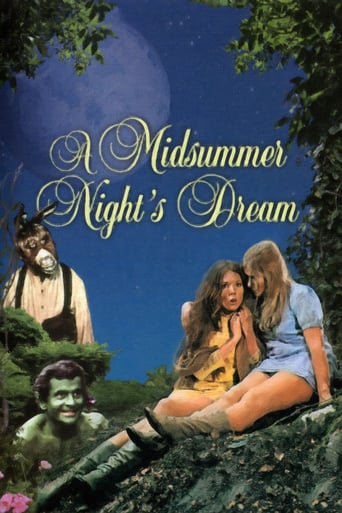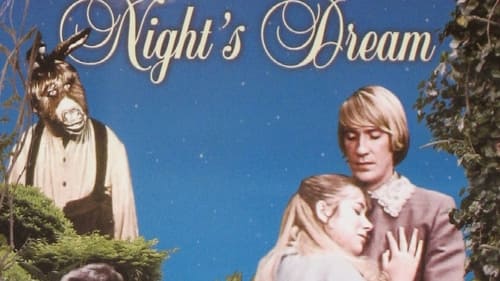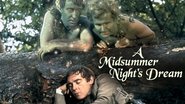GusF
As with "Much Ado About Nothing" and "Romeo and Juliet", this is another Shakespearean play with which I was only familiar through reputation but I have been familiar with three of its characters for most of my life. My first exposure to Shakespeare was through the classic 1990s animated series "Gargoyles" in which Puck, Oberon and Titania were all recurring characters, as were Macbeth and the Three Witches. One of the cleverest and most complex of the Shakespearean plays which I have read or seen performed, it features three interconnected story lines and wonderfully blends the lines between fantasy and reality. The play is also extremely witty and occasionally downright hilarious. Made by the Royal Shakespeare Company, it has one of the best casts of any film that I have ever seen: Judi Dench, Ian Richardson, David Warner, Helen Mirren (who also appeared in the 1981 BBC adaptation, though as Titania rather than Hermia), Diana Rigg, Michael Jayston and Ian Holm. Rigg was already very famous for her role as Emma Peel in "The Avengers" and Warner had starred in several big films such as "Tom Jones" and "Morgan - A Suitable Case for Treatment". While most of the other cast members were not well known for their on screen work in 1968, they became so in the years and decades that followed. The strongest performer is certainly Judi Dench, whom I consider to be the best living actress. She is captivating as the proud, forceful queen of the fairies whose dispute with her husband Oberon, played wonderfully by Richardson, serves as the catalyst for the events of the play. However, she is just as good in the scenes in which she is required to be softer such as those with the fairy children (two of whom are played by her nieces Clare and Emma) and those in which she professes her love to Bottom after Puck has given him the head of a donkey. All of the actors whom I have mentioned are top notch but I have to single out Rigg as the kind and vulnerable Helena who sharply feels the pangs of her unrequited love for the Hermia loving Demetrius, who can't stand her until the fairies have their way with him, and Warner as the dashing, romantic Lysander, who adores Hermia until the fairies have their way with him and then comes to despise her before going back to adoring her! For much of his later career, he was typecast as sinister characters and was and is excellent at that but it's always great to see him play a gentler character (for the most part, anyway).The rest of the film's cast is just as strong, particularly Paul Rogers as Bottom (who also played the role in a 1958 TV adaptation), Sebastian Shaw as Quince, Derek Godfrey as Theseus, Barbara Jefford as Hippolyta and Bill Travers as Snout, who was one of the then best known actors in the film in spite of his fairly small role. Rogers, one of the few actors in the film with whom I was largely unfamiliar, is an absolute laugh riot as the overly enthusiastic Bottom, who seeks to take over the play-within-the-play "Pyramus and Thisbe" by playing every part himself. I wonder if the exasperation felt by Quince whenever Bottom made a suggestion came from Shakespeare's own experience working with difficult actors. With his infectious hearty laugh, Rogers is even funnier once he receives the head of a donkey. The scenes with Judi Dench in which Titania fawns over Bottom are the funniest in the entire film.In spite of the strength of its cast, however, the film is not perfect. Peter Hall may have been a great theatre director and the British theatrical world owes him a huge debt for founding the RSC but he was not a good film director. Compared to other Shakespearean films that I have seen, this one is shot in a fairly mechanical, workmanlike fashion and the editing is often very bad. Laurence Olivier and Kenneth Branagh's versions of "Hamlet" and Zeffirelli's "Romeo and Juliet" were all beautiful looking films but, in spite of the location work, this seems more like a filmed stage play rather than a film adaptation of one. As much as I loved Bottom, the scenes featuring the entire acting troupe were the least interesting of the play. Consequently, the film drags a bit after Lysander, Hermia, Demestrius and Helena leave the forest. While the acting troupe's terrible production was funny, it was not as funny as it could have been and went on a bit long. Since I haven't read the play, however, I don't know what, if anything, was left out and the final act may have been better structured if it had been performed in full.If it were to rate this film based solely on the acting, I would give it full marks without hesitation but there are other issues to consider so I can't, I'm afraid.
oshram-3
I'll come right out and say it – not everything Shakespeare ever wrote is a gem that needs to be enshrined forever. What's more, most movies of Shakespeare plays are even worse; they're either faux-stagey, as if the actors wish you to keep in mind that this is Shakespeare, for God's sake, or they go the other way and become overly artsy. I only own a few on them on disc (Ken Branagh's Much Ado and Henry V, where the tongue-twisting dialogue flows so effortlessly it appears to be ad-libbed), as most of the versions I have encountered are artless train wrecks; even Orson Welles' Othello is to my mind wince-worthy.I tried this version out solely because Diana Rigg was in it. Granted, so was the rest of the Royal Shakespeare Company circa 1968, an impressive list (Ian Holm, David Warner, Helen Mirren, Judi Densch, etc.); and this is a difficult play to do well because its plot is so hoary, and the play-within-the-play so tedious, that these actors can hardly be held accountable for the bard's sins.Not that they don't make enough of their own, however. Central to the film's weakness is that it can't figure out its own identity. There is a stab at period costume here and there, but then Rigg shows up in suede go-go boots (not to mention Queen Hippolyta in a leather dress and thigh boots). The story is set in Athens, but the landscape (at least they didn't use a soundstage) is Tudor England, as are whatever costumes attempt to be period (the period of Shakespeare, not Athens). The film takes place almost wholly outside, which is a relief, but unlike, say, Branagh's Much Ado, which takes advantage of some gorgeous Tuscan landscape, most of the time here we are treated to some non-descript copses of trees. Add to that budgetary problems – Puck, Oberon, and gang appear as green-tinted hippies, with their faces not even matching the hue of their bodies – and you have a production that is easier to laugh at than with.Most of the actors give it their all, but most of them appear miscast. Rigg is far too old and worldly for the dopey Helena, and Derek Godfrey's Theseus seems more like a baron in some Russian novel (though admittedly I kept getting distracted by his helmet-head bouffant). You'll see a lot more of Judi Densch than you ever wanted to, as her costume amounts to green paint and teeny pasties. I did like Warner's Lysander, who appeared the most natural of the four young lovers, and Ian Holm's Puck, but it's impossible not to enjoy a Holm performance.I tend to think Shakespeare movies tell you more about the period when they are made rather than when they are set (much like the plays themselves), and this one is no different. Part old school, part hippie romp, the film unintentionally reflects the chaos of the late sixties, of a cultural shift, or wanting to take something classic and make it new but unfortunately having no idea how. The end result is a lurching effect, its low budget and low-tech seeming impossibly crude to viewers used to spectacles such as Lord of the Rings (even Xena's make-up jobs would make these look silly). It's interesting as a novelty piece to look at where Shakespeare presentations were, and where they were aiming to be, four decades ago; certainly we have a different emphasis now, as actors forty years from now will no doubt reinterpret the bard in their own fashion (android Iago?). For all but a die-hard fan of any of the regulars or of Shakespeare's work, though, this film is a pass. It did, however, help shed light on why a talented actress who was part of the Royal Shakespeare company for many years is chiefly remembered for judo kicks and leather catsuits.
artzau
This is the Royal Shakespeare Company at its best. I mean, hey. Not only do we get a treat to Diana Rigg's Helena in her pre-Emma Peel days but look at lovely Helen Mirren's delightful Hermia. The youths, David Warner and Michael Jayston are great, twirled and swizzled by Ian Holm's delightful Puck messing up the good intentions of the bug-eyed Ian Richardson's Oberon. But, a semi-nude Judi Dench-- all in green-- is likewise delightful in her cavorting with Paul Rogers's Bottom. The rest of the players within a play, Swift, Shaw, Eccles, Normington and the great Bill Travers (who can ever forget him in 'Big Time Operators,' or 'Wee Geordie?')as Snout. There is wonder in this romp through the woods, where the lovers keep getting dirtier and dirtier, as the sprites, fairies and gnomes are green. This is a wonderful version that will only be approached 31 years later. As for the later (1996) RSC version..., well, you'll have to go there and see my comments. But, in my view, it can't approach the fun, mirth and joy of this wonderful production.
gjf221b
The Bard and the Royal Shakespeare Company fight the Swinging '60s to a respectable draw in this production, which does feature nearly all of the text of the play, splendidly _ if often frenetically _ delivered. Director Peter Hall couldn't quite come up with a film equivalent of his famous stage production, which featured modern dress, a stark white set, and imaginative use of trapezes. Instead he picked an approach heavily influenced by the French New Wave and its English imitators, notably Richard Lester. There's lots of jangly, abrupt editing _ which sometimes, as intended, captures the supernatural flitting of the fairies, and sometimes is just annoying. There's lots of talking to the camera, and a certain catch-as-catch-can attitude: shots don't match up, and, although the main action is supposed to take place at night, there's sometimes no effort to disguise the sunlight streaming through the trees. (Of course, perhaps some of this was the result not of artistic decisions, but merely of haste and a tiny budget.) It's somehow a very '60s Athens _ Hermia and Helena wear cute miniskirts, the four lovers get so twig-torn and mud-spattered that they look like refugees from Woodstock, and the fairies look like green-skinned members of a back-to-nature commune. For all the eccentricities, this festive but haunting play is done straight and done well, and the cast ranges from solid to splendid. The two standouts are Diana Rigg (Helena) and Judi Dench (Titania) _ and this is your one and only chance to see the former sucking her thumb and the latter wearing an outfit (consisting mainly of body paint and flecks of vegetation) that Blaze Starr might have found drafty.





